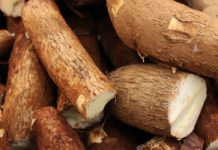Fun Facts About Jicama
Jicama is a tuber similar to potatoes and is pronounced either HEE-ka-ma or, more commonly, HIK-ka-ma. The skin is thick and brown, while the flesh is white, crisp, and juicy. The root of the jicama plant is known by several other names, including Mexican jam bean, Mexican potato, sweet turnip, and Mexican turnip.
Jicama can be sliced and eaten raw, but it can also be cooked and used as an ingredient in an assortment of dishes to take advantage of the vegetable’s nutritive qualities. Jicama can also be used in place of water chestnuts as a low-carb alternative.
The Nutritional Values of Jicama
The USDA (United States Department of Agriculture) exhibited the following data regarding the nutritional value of 1 cup (120 grams) of raw jicama slices:
- Calories: 46
- Fat: 0.1g
- Sodium: 5.2mg
- Carbohydrates: 11g
- Fiber: 5.9g
- Sugars: 2.2g
- protein: 0.9g
Health Benefits of Jicama
Helps with Digestion
The high levels of dietary fiber that may be found in jicama are potentially one of the most valuable components of this vegetable.
As documented by a study issued in the journal Nutrients, foods that are high in dietary fiber may help increase the bulk of stool, making it more effortless for the stool to move through the digestive tract and providing relief for conditions such as constipation.
In addition, jicama may be an abundant source of a soluble fiber known as oligofructose inulin. This type of carbohydrate tastes sweet but does not break down into simple sugars during metabolism.
Because of this, eating jicama might be a wonderful option for diabetics who want to enjoy some sweet cuisine without worrying about their blood sugar levels changing.
Helpful for Losing Weight
Jicama is a great food to include in a diet to help one healthily lose weight since they are rather low in calories and high in fiber.
Because it moves more slowly through your digestive tract, fiber helps you feel fuller for longer, which in turn may lower the amount of food you eat and the amount of hunger you experience.
According to one study, increasing your daily fiber consumption by 14 grams could potentially decrease the quantity of calories you consume by up to 10%, resulting in a weight loss of 1.9 kilograms (4 pounds) after four months.
Jicama has only 100 calories per cup (133 grams), but they nevertheless manage to pack 6.5 grams of fiber into that same amount.
Furthermore, the water content of this root vegetable is quite high, at around 79.5 percent.
According to some research, consuming a diet that is high in water content may be connected with a lower calorie intake and a greater rate of weight loss.
A Reliable Supply of Antioxidants
Jicama contains high amounts of vitamin C. Antioxidants reduce the oxidative stress that is brought on by free radicals, which helps to delay the damage that is done to cells and the aging process. The immune system is bolstered by vitamin C, which in turn protects the body from a wide range of illnesses.
The National Center for Complementary and Integrative Health suggests that oxidative stress may be the root cause of aging as well as a number of diseases, including cancer, cardiovascular disease, and diabetes.
Immune Function Support
One serving of jicama already satisfies around one-quarter of your recommended daily intake of vitamin C. Jicama is an excellent source of this nutrient.
Vitamin C is a water-soluble vitamin that is critically important to the functioning of the immune system.
One review suggests that reducing the severity of cold and flu symptoms and shortening the duration of other respiratory tract illnesses can be achieved by increasing the amount of vitamin C in one’s diet to the recommended levels.
It also has the potential to help in the prevention and treatment of other illnesses, such as pneumonia, malaria, and infections that cause diarrhea.
In addition, jicama has a high concentration of disease-fighting antioxidants, including quercetin, kaempferol, and apigenin. These compounds have the potential to boost your immunity and protect you against illness.
Assists in the Treatment and Reversal of Diabetes
Jicama also possesses distinctive qualities that may be beneficial for diabetics and the regulation of blood glucose levels. In a study conducted in 2016, it was discovered that administering jicama extract to mice over a period of six weeks dramatically reduced blood sugar and Hgb A1c levels and enhanced insulin sensitivity.
Because of its low glycemic load, jicama is an excellent choice for people who have diabetes because it does not provoke a surge in blood sugar levels.
Additionally, it has a high fiber content, which helps in weight loss, largely by making one feel fuller for longer. In addition to all that, it helps in the battle against diabetes in this way.
Jicama Has Positive Effects on Brain Function
Vitamin B6, which can be found in jicama, is a nutrient that helps to boost one’s cognitive capacities as well as the brain’s capabilities.
Vitamin B6 also plays a role in the process of breaking down all of the body’s proteins into other proteins and amino acids, which contributes to an improvement in the functioning of a variety of organs and the metabolic processes overall.
Therefore, including jicama in one’s diet can aid in improving the way in which one’s brain functions.
Enhances the Overall Health of One’s Heart
 Jicama lowers the risk of cardiovascular disease by helping to minimize spikes in blood sugar and improving insulin sensitivity. Jicama also helps to lower blood sugar levels overall.
Jicama lowers the risk of cardiovascular disease by helping to minimize spikes in blood sugar and improving insulin sensitivity. Jicama also helps to lower blood sugar levels overall.
Jicama is high in fiber, which helps reduce inflammation, LDL cholesterol levels, and blood pressure. Additionally, it has a high nitrate content, which has been shown to increase blood circulation and flow.
There is also some proof to indicate that consuming jicama can reduce the likelihood of developing blood clots. In a study that was conducted in 2016, it was found that healthy people who ingested 500 milliliters of jicama juice on a daily basis had a lower chance of developing blood clots when compared to a control group that drank guava juice and water.
Cancer-Fighting Properties
Jicama is a good choice to include in your diet since it contains dietary fiber, which can be excellent for your digestive system.
As reported by findings of a study that was conducted in 2014 and led by Otles and Ozgoz, the consumption of dietary fiber may provide some degree of protection against a variety of diseases and conditions, some of which include colon cancer, gastroesophageal reflux disease (GERD), duodenal ulcer, and certain gastrointestinal diseases.
Additionally, jicama roots contain an abundance of antioxidants, including vitamin C.
According to the National Cancer Institute, antioxidants help neutralize the effects of free radicals, which in turn can help lessen the risk of numerous different types of cancer as well as heart disorders.
Nevertheless, additional research is required to investigate the possible link between jicama consumption and a reduction in the risk of developing cancer in humans.
Prevents Anemia
Jicama includes a small quantity of iron and folate, both of which are necessary for the production of healthy red blood cells as well as the promotion of healthy cell growth and activities.
This avoids anemia, a condition in which the body does not have sufficient healthy red blood cells. Anemia is a condition that can lead to various health issues, such as weakness, weariness, and irritation.
Helps Control Blood Pressure
Jicama is a good option for managing blood pressure because it has a high potassium content. Potassium is recognized as a vasodilator, which means it relaxes the tension in blood vessels and arteries, which in turn lessens the amount of strain placed on the cardiovascular system.
Researchers from the University of Alabama carried out a study in 2010 that supports the hypothesis that a decline in dietary sodium and an upsurge in dietary potassium could have a beneficial impact on the reduction of blood pressure. This decline might have something to do with better heart health and avoiding strokes.
In contrast to sodium’s role in this process, potassium is also vital for maintaining fluid equilibrium throughout the body. This helps to keep our bodies hydrated and functioning at a high level.
Jicama Enhances Your Mood
Jicama is rich in vitamin B6, which has a direct influence on the transmitters in our brain that are in control of regulating our mood. They are beneficial in the treatment of depression, anxiety, exhaustion, and pain. Consuming jicama helps us meet our body’s requirement for vitamin B6 and, as a result, improves our mood.
Allergies
In spite of the fact that jicama is a legume (and, as a result, a distant relative of common allergens such as peanuts and soy), there is only one incidence of jicama allergy that has ever been documented in the medical literature.
 If, after eating jicama, you begin to feel allergy symptoms like itching or swelling around the mouth, you should consult a doctor so that your disease can be properly diagnosed and treated.
If, after eating jicama, you begin to feel allergy symptoms like itching or swelling around the mouth, you should consult a doctor so that your disease can be properly diagnosed and treated.




